BRIANNA ACADEMICS
NURSING
- 262
- 0
- 3
Community
- Followers
- Following
8 Reviews received
265 items
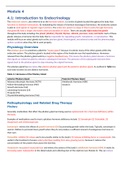
NURS 251 Module 4 Portage Learning
NURS 251 Module 4 Portage Learning Module 4 4.1: Introduction to Endocrinology The endocrine system, also referred to as the hormone system, is a series of glands located throughout the body that functions to maintain homeostasis. By modulating the release of chemical messengers (hormones), the endocrine system is able to send signals to regulate organ functions. The endocrine system is unique in that it works through hormones that generally have a longer and slower onset and duration of...
- Exam (elaborations)
- • 12 pages •
NURS 251 Module 4 Portage Learning Module 4 4.1: Introduction to Endocrinology The endocrine system, also referred to as the hormone system, is a series of glands located throughout the body that functions to maintain homeostasis. By modulating the release of chemical messengers (hormones), the endocrine system is able to send signals to regulate organ functions. The endocrine system is unique in that it works through hormones that generally have a longer and slower onset and duration of...
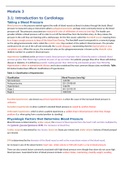
NURS 251 Module 3 Portage Learning
NURS 251 Module 3 Portage Learning Module 3 3.1: Introduction to Cardiology Taking a Blood Pressure Blood pressure is the pressure exerted against the walls of blood vessels as blood circulates through the body. Blood pressure is measured using an instrument called a sphygmomanometer, perhaps more commonly known as the blood pressure cuff. The pressures associated are measured in units of millimeters of mercury (mm/Hg). The health care provider inflates a blood pressure cuff in order t...
- Summary
- • 16 pages •
NURS 251 Module 3 Portage Learning Module 3 3.1: Introduction to Cardiology Taking a Blood Pressure Blood pressure is the pressure exerted against the walls of blood vessels as blood circulates through the body. Blood pressure is measured using an instrument called a sphygmomanometer, perhaps more commonly known as the blood pressure cuff. The pressures associated are measured in units of millimeters of mercury (mm/Hg). The health care provider inflates a blood pressure cuff in order t...
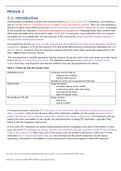
NURS 251 Module 2 Portage Learning
NURS 251 Module 2 Portage Learning Module 2 2.1: Introduction Nonprescription medications, perhaps more commonly known as over-the-counter (OTC) medications, are medications that are available without a prescription and are available in most cases without restriction. There are a few medications that do not require a prescription but are kept behind the pharmacy counter and ID is required for purchase. An example of this would be any medication containing the decongestant pseudoephedrin...
- Summary
- • 9 pages •
NURS 251 Module 2 Portage Learning Module 2 2.1: Introduction Nonprescription medications, perhaps more commonly known as over-the-counter (OTC) medications, are medications that are available without a prescription and are available in most cases without restriction. There are a few medications that do not require a prescription but are kept behind the pharmacy counter and ID is required for purchase. An example of this would be any medication containing the decongestant pseudoephedrin...
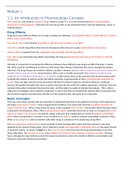
NURS 251 Module 1 Portage Learning
NURS 251 Module 1 Portage Learning Module 1 1.1: An Introduction to Pharmacology Concepts Pharmacology is the study or science of drugs. What is a drug? A drug is any chemical that affects the physiologic processes of a living organism. Commonly, the term drug refers to any medication that is used for diagnosing, curing, or treating disease. Drug Effects Drugs have many different effects on the body including the following: (1) therapeutic effects, (2) side effects, (3) adverse effects...
- Exam (elaborations)
- • 14 pages •
NURS 251 Module 1 Portage Learning Module 1 1.1: An Introduction to Pharmacology Concepts Pharmacology is the study or science of drugs. What is a drug? A drug is any chemical that affects the physiologic processes of a living organism. Commonly, the term drug refers to any medication that is used for diagnosing, curing, or treating disease. Drug Effects Drugs have many different effects on the body including the following: (1) therapeutic effects, (2) side effects, (3) adverse effects...
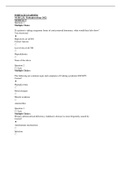
PORTAGE LEARNING NURS 231: Pathophysiology 2022 MODULE 9
PORTAGE LEARNING NURS 231: Pathophysiology 2022 MODULE 9 Question 1 Multiple Choice If a patient is taking exogenous forms of corticosteroid hormones, what would their labs show? You Answered High levels of ACTH Correct Answer Low levels of ACTH Hyperkalemia None of the above Question 2 5 / 5 pts Multiple Choice: The following are common signs and symptoms of Cushing syndrome EXCEPT: Correct! Hypoglycemia Mood changes Muscle weakness Amenorrhea Question 3 5 / 5 pts Multipl...
- Exam (elaborations)
- • 7 pages •
PORTAGE LEARNING NURS 231: Pathophysiology 2022 MODULE 9 Question 1 Multiple Choice If a patient is taking exogenous forms of corticosteroid hormones, what would their labs show? You Answered High levels of ACTH Correct Answer Low levels of ACTH Hyperkalemia None of the above Question 2 5 / 5 pts Multiple Choice: The following are common signs and symptoms of Cushing syndrome EXCEPT: Correct! Hypoglycemia Mood changes Muscle weakness Amenorrhea Question 3 5 / 5 pts Multipl...

PORTAGE LEARNING NURS 231: Pathophysiology 2022 MODULE 8
PORTAGE LEARNING NURS 231: Pathophysiology 2022 MODULE 8 Question 1 2.5 / 2.5 pts Each of the following statements are true regarding control over the GFR except: The kidney can maintain a constant GFR despite variations in the arterial blood pressure of the rest of the body. The sympathetic nervous system can supersede the renal autoregulatory system. Correct! The RAA responds when blood pressure rises above normal limits. The RAA responds when blood pressure drops below normal limit...
- Exam (elaborations)
- • 8 pages •
PORTAGE LEARNING NURS 231: Pathophysiology 2022 MODULE 8 Question 1 2.5 / 2.5 pts Each of the following statements are true regarding control over the GFR except: The kidney can maintain a constant GFR despite variations in the arterial blood pressure of the rest of the body. The sympathetic nervous system can supersede the renal autoregulatory system. Correct! The RAA responds when blood pressure rises above normal limits. The RAA responds when blood pressure drops below normal limit...
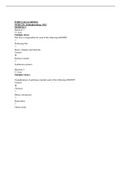
PORTAGE LEARNING NURS 231: Pathophysiology 2022 MODULE 7
PORTAGE LEARNING NURS 231: Pathophysiology 2022 MODULE 7 Question 1 5 / 5 pts Multiple choice The liver is responsible for each of the following EXCEPT: Producing bile Stores vitamins and minerals Correct! Releases insulin Synthesizes protein Question 2 5 / 5 pts Multiple Choice: Complications of gallstones include each of the following EXCEPT: Correct! Cirrhosis Biliary obstruction Pancreatitis Cholecystitis Question 3 5 / 5 pts Multiple choice: Treatments for gastroesop...
- Exam (elaborations)
- • 7 pages •
PORTAGE LEARNING NURS 231: Pathophysiology 2022 MODULE 7 Question 1 5 / 5 pts Multiple choice The liver is responsible for each of the following EXCEPT: Producing bile Stores vitamins and minerals Correct! Releases insulin Synthesizes protein Question 2 5 / 5 pts Multiple Choice: Complications of gallstones include each of the following EXCEPT: Correct! Cirrhosis Biliary obstruction Pancreatitis Cholecystitis Question 3 5 / 5 pts Multiple choice: Treatments for gastroesop...
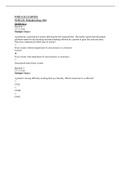
PORTAGE LEARNING NURS 231: Pathophysiology 2022 MODULE 6
PORTAGE LEARNING NURS 231: Pathophysiology 2022 MODULE 6 Question 1 2.5 / 2.5 pts Multiple Choice: A patient has experienced a seizure affecting the left temporal lobe. The family reports that the patient exhibited repetitive lip smacking and hand rubbing followed by a period of great fear and insecurity. They have experienced which type of seizure? Focal seizure without impairment of consciousness or awareness Correct! Focal seizure with impairment of consciousness or awareness Gene...
- Exam (elaborations)
- • 9 pages •
PORTAGE LEARNING NURS 231: Pathophysiology 2022 MODULE 6 Question 1 2.5 / 2.5 pts Multiple Choice: A patient has experienced a seizure affecting the left temporal lobe. The family reports that the patient exhibited repetitive lip smacking and hand rubbing followed by a period of great fear and insecurity. They have experienced which type of seizure? Focal seizure without impairment of consciousness or awareness Correct! Focal seizure with impairment of consciousness or awareness Gene...
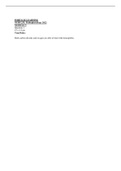
PORTAGE LEARNING NURS 231: Pathophysiology 2022 MODULE 5
PORTAGE LEARNING NURS 231: Pathophysiology 2022 MODULE 5 Question 1 2.5 / 2.5 pts True/False: Both carbon dioxide and oxygen are able to bind with hemoglobin. Correct! True False Question 2 2.5 / 2.5 pts True/False: Exercise, allergens, and emotion can all contribute to an asthma attack. Correct! True False Question 3 2.5 / 2.5 pts The breathing rate is determined by input from that monitor oxygen, carbon dioxide, and pH levels in the blood. Your Answer: chemorecpetors che...
- Exam (elaborations)
- • 9 pages •
PORTAGE LEARNING NURS 231: Pathophysiology 2022 MODULE 5 Question 1 2.5 / 2.5 pts True/False: Both carbon dioxide and oxygen are able to bind with hemoglobin. Correct! True False Question 2 2.5 / 2.5 pts True/False: Exercise, allergens, and emotion can all contribute to an asthma attack. Correct! True False Question 3 2.5 / 2.5 pts The breathing rate is determined by input from that monitor oxygen, carbon dioxide, and pH levels in the blood. Your Answer: chemorecpetors che...
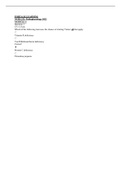
PORTAGE LEARNING NURS 231: Pathophysiology 2022 MODULE 4
PORTAGE LEARNING NURS 231: Pathophysiology 2022 MODULE 4 Question 1 2.5 / 2.5 pts Which of the following increases the chance of clotting? Select all that apply. Vitamin K deficiency Von Willebrand factor deficiency Correct! Protein C deficiency Thrombocytopenia Question 2 2.5 / 2.5 pts A deficiency in which of the following would lead to a hypercoagulable state? Select all that apply. Correct! Protein C Correct! Protein S Factor II Factor VII Factor IX Factor X Correct! A...
- Exam (elaborations)
- • 11 pages •
PORTAGE LEARNING NURS 231: Pathophysiology 2022 MODULE 4 Question 1 2.5 / 2.5 pts Which of the following increases the chance of clotting? Select all that apply. Vitamin K deficiency Von Willebrand factor deficiency Correct! Protein C deficiency Thrombocytopenia Question 2 2.5 / 2.5 pts A deficiency in which of the following would lead to a hypercoagulable state? Select all that apply. Correct! Protein C Correct! Protein S Factor II Factor VII Factor IX Factor X Correct! A...

CCEA Government and Politics Assessment Unit AS 2 The British Political Process
DEWIT’S MEDICAL SURGICAL NURSING CONCEPTS AND PRACTICE 4TH EDITION STROMBERG TEST BANK 2022
[Question Paper: Pearson Edexcel A-Level 2022] Politics Paper 3: Comparative Politics – Global Politics
DEWIT’S MEDICAL SURGICAL NURSING CONCEPTS AND PRACTICE 4TH EDITION STROMBERG TEST BANK 2022
Questions&Answers ALS FINAL EXAM 2022